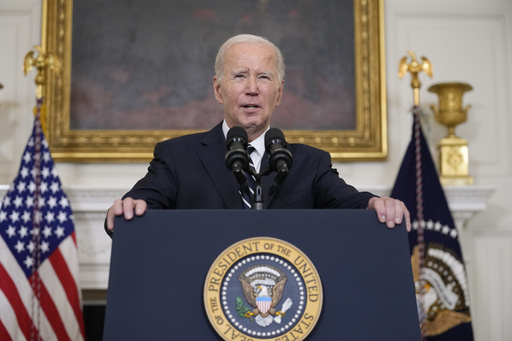Biden in Israel Wednesday for solidarity visit – Blinken
TEL AVIV — US President Joe Biden will pay a “solidarity” visit to Israel today, Secretary of State Anthony Blinken said early Tuesday, following nearly eight hours of talks with Prime Minister Benjamin Netanyahu on ensuring the protection of civilians in Gaza.
The conflict intruded firsthand on the talks as air sirens went off. Blinken, Netanyahu and aides took shelter in a bunker for five minutes, with waiting journalists ushered down a stairwell, before the US-backed Iron Dome system destroyed the incoming rocket.
“The President will reaffirm United States solidarity with Israel and our ironclad commitment to its security,” said the top US diplomat.
Blinken said Biden would hear a firsthand account on Israel’s military needs and work with Congress to fulfill them.
He also said the US President hopes to “hear from Israel how it will conduct its operations in a way that minimizes civilian casualties and enables humanitarian assistance to flow to civilians in Gaza in a way that does not benefit Hamas.”
Article continues after this advertisementIn Washington, National Security Council spokesperson John Kirby said the US president would visit Tel Aviv, then would travel onward to Jordan to see King Abdullah II, a key US partner, as well as Palestinian leader Mahmoud Abbas and Egyptian President Abdel Fattah el-Sisi.
Article continues after this advertisementPlan for civilians
Washington has backed Israel’s right to strike back at Hamas, but it has also urged measures to ease the impact on ordinary Palestinians caught in the crossfire.
Blinken said that Israel promised to work with the United States on letting in foreign assistance, adding that the two sides agreed to “develop a plan.”
Officials did not set a timeline but expected David Satterfield, a veteran former US ambassador who started a new job on Monday coordinating humanitarian aid, to work out details.
Israel’s airstrikes have flattened entire neighborhoods in the blockaded Gaza Strip and killed at least 2,750 people, most of them civilians.
The bombardment, coupled with an Israeli order to evacuate the north of the Gaza Strip that borders Israel, has forced more than a million Palestinians to flee their homes for the south of the enclave since the 10-day conflict began, according to UNRWA, the UN agency serving Palestinian agencies.
Entire families, young children and the elderly have packed what belongings they can, bedding down in any available space, indoors and out.
Thousands more Palestinians have massed at the Rafah border crossing with Egypt in an effort to flee.
“The situation is catastrophic beyond what I could have imagined,” said Jamil Abdullah, a Palestinian-Swede who is hoping to leave after being forced to sleep on the street.
“There are corpses in the streets. Buildings are crashing down on their inhabitants. Blood is everywhere. The smell of the dead is everywhere.”
Reporters of Agence France-Presse (AFP) in Gaza said morgues were overflowing, and corpses wrapped in white body bags were even being stored in an ice-cream truck.
Blinken said the United States and Israel were discussing the “possibility of creating areas to help keep civilians out of harm’s way.”
The Biden administration earlier persuaded Israel to restore water partially after earlier vows by Israeli leaders to cut off all water, food and energy following the attacks.
Defense needs
Meanwhile, the top US general overseeing American forces in the Middle East has made an unannounced trip to Israel ahead of Biden’s planned visit.
“I’m here to ensure Israel has what it needs to defend itself, particularly focused on avoiding other parties expanding the conflict,” Army Gen. Michael “Erik” Kurilla, head of the US Central Command, told Reuters, which is traveling with him.
A US official also told Reuters that Kurilla was scheduled to hold high-level meetings with Israel’s military leadership on its defense requirements.
The United States has a network of bases in the Middle East with troops, fighter aircraft and warships.
US troops have also been told to be ready to deploy within 24 hours if notified—instead of the usual 96 hours. This could include units that provide assistance like medical aid if needed, a US official said on Monday.
